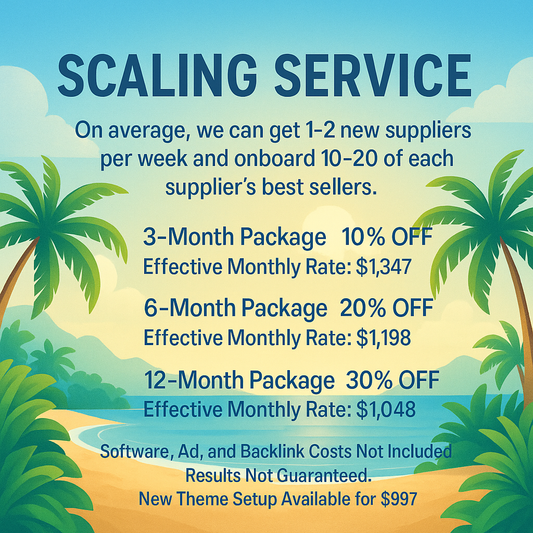
Mastering SEO Audits for Your Ecommerce Success
Hey there, fellow ecommerce enthusiasts! Trevor Fenner here, and today we're diving deep into a crucial element of your online business success: conducting SEO audits for your ecommerce website. If you're ready to boost your visibility on search engines and enhance your overall online performance, buckle up! We've got a lot to cover, and the insights gained from effective SEO audits can catapult your site ahead of your competition. So, let's get started!
Why Conduct an SEO Audit?
Understanding the "why" behind an SEO audit gives you the foundation you need to grow. SEO audits help you analyze your website’s performance, identify technical issues, and improve your content strategies. Here are just a few reasons why conducting SEO audits regularly should be part of your ecommerce routine:
- Evaluate Website Health: An SEO audit enables you to see how well your website is optimized for search engines.
- Improve Rankings: By identifying underperforming keywords, you can improve your rankings and visibility on Google.
- Boost User Experience: A well-optimized website not only ranks better but also provides a superior user experience.
- Enhance Conversion Rates: Effective SEO can drive targeted traffic to your site, leading to increased sales and better ROI.
- Stay Competitive: Regular audits help you keep an eye on your competitors and adjust your SEO strategies accordingly.
How to Conduct an Effective SEO Audit
Now that you know the importance of an SEO audit, let’s break down the steps to effectively conduct one for your ecommerce store.
1. Analyze Your Current SEO Performance
This step involves evaluating where you currently stand in the SEO landscape. Use tools like Google Analytics and Google Search Console to track your organic traffic, search queries, and click-through rates. Look for trends in your data—are there specific pages that are performing better or worse than expected?
2. Conduct a Technical SEO Review
Technical SEO is key to ensuring search engines can properly crawl and index your site. Here’s what to check:
- Site Speed: Use tools like Google PageSpeed Insights to analyze how fast your site loads. Aim for a loading time under 3 seconds.
- Mobile Optimization: Check if your site is mobile-friendly. With an increase in mobile shopping, Google prioritizes mobile responsiveness in their ranking algorithms.
- Crawl Errors: Look for any crawl errors in Google Search Console. Fixing these can help search engines reach and index more of your content.
- XML Sitemap: Ensure your XML sitemap is up-to-date and submitted to Google. This helps search engines find all your pages efficiently.
- Broken Links: Use tools to identify any broken links on your site. Fixing these will improve user experience and may lead to better rankings.
3. Review On-Page SEO Elements
On-page SEO focuses on the content and HTML source code of your webpages. Here’s what you should audit:
- Title Tags: Ensure that each page has a unique title tag containing relevant keywords.
- Meta Descriptions: A well-crafted meta description can improve your click-through rates significantly. Ensure they are engaging and include keywords.
- Headers: Use header tags (H1, H2, H3) to structure your content. This helps both users and search engines to understand your content better.
- Images: Optimize images with proper file names and alt tags to improve visibility in image search results.
4. Evaluate Content Quality
High-quality content drives engagement and conversions. Review your existing content and ask yourself:
- Is it informative and valuable to your audience?
- Does it answer the questions your target audience is searching for?
- Is it optimized for relevant keywords without stuffing?
- Are your product descriptions unique and engaging?
For ecommerce websites, it's essential to avoid duplicate content that can hinder rankings. If you're dropshipping or using manufacturer descriptions, make sure to customize and enhance them!
5. Backlink Analysis
Backlinks are a major player in SEO, indicating authority and trustworthiness. Use tools like Ahrefs or Moz to analyze your backlink profile. Look for:
- Quality of Backlinks: Focus on acquiring backlinks from reputable, relevant sites in your industry.
- Anchor Text: Ensure that your backlinks contain relevant anchor text to improve SEO.
- Broken Backlinks: Identify when other sites link to broken links on your own site and reach out to fix them.
Revising Your Email Marketing Strategy
SEO within your email marketing strategy is vital for driving traffic. Ensure you send out regular newsletters and promotional emails that link back to your ecommerce store. This not only engages your audience but also informs Google that your site is popular, potentially boosting your SEO rankings.
Integrating Google Shopping Ads into Your Strategy
Another essential aspect of maximizing your ecommerce visibility is utilizing Google Shopping Ads. Integrating these ads into your ecommerce SEO strategy can enhance your online presence. Here's how:
- Keyword Optimization: Conduct keyword research tailored for your Google Shopping campaigns.
- Product Data: Ensure your product feed is up to date. This includes product titles, descriptions, and prices that align with user searches.
- Image Quality: Use high-quality images and ensure they comply with Google's product image guidelines.
These practices ensure your products appear prominently and attractively in Google searches, driving more traffic to your store.
Monitoring Your Progress
SEO isn’t a set-it-and-forget-it process. After conducting your audit and implementing changes, you’ll want to monitor your progress over time. Set specific KPIs (Key Performance Indicators) that align with your business objectives. Some vital KPIs to track include:
- Organic Traffic Growth
- Page Load Speed
- Conversion Rates from Organic Search
- Keyword Ranking Changes
- Backlink Acquisition
Use Google Analytics and other reporting tools to measure these KPIs regularly. Adjust your strategies based on the performance data you gather to ensure continued progress.
Putting It All Together
Implementing an effective SEO audit can lead to significant improvements in your ecommerce business. From optimizing your content to enhancing your technical aspects, every step matters. Embrace this process and remember, it’s not just about getting found – it’s about being found by the right customers.
Take pride in your ecommerce journey! By integrating refined SEO practices into your site, you’re not just enhancing rankings, but also establishing a stronger connection with your customers. So roll up your sleeves, get to work on that audit, and watch your ecommerce business thrive like never before! Happy selling!


















